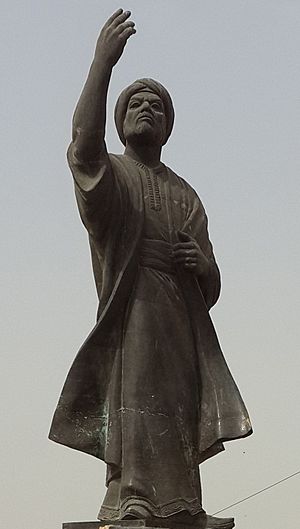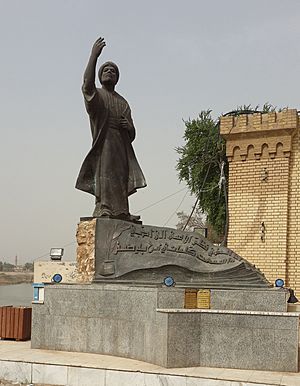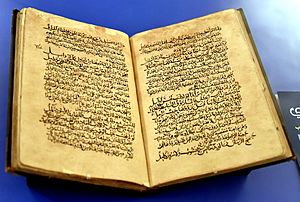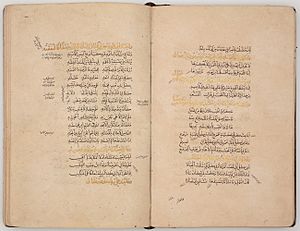Al-Mutanabbi facts for kids
Quick facts for kids
Al-Mutanabbi
(المتنبي) |
|
|---|---|

Al-Mutanabbi Statue in Baghdad
|
|
| Born | 915 |
| Died | 23 September 965 (aged approximately 50) An Numaniyah, Abbasid Caliphate
|
| Other names | (أبو الطيب احمد بن الحسين المتنبّي) |
| Era | Islamic Golden Age (Middle Abbasid era) |
| Region | Arab world, Muslim world |
|
Main interests
|
Arabic poetry |
|
Influences
|
|
|
Influenced
|
|
Abū al-Ṭayyib Aḥmad ibn Al-Ḥusayn Al-Mutanabbī Al-Kindī (أبو الطيب أحمد بن الحسين المتنبّي الكندي) was a very famous Arab poet who lived from about 915 to 965 CE. He was born in Kufa, a city in what was then the Abbasid Caliphate, a large Islamic empire.
Al-Mutanabbi is known as one of the greatest and most important poets in the Arabic language. Many of his poems have been translated into over 20 languages around the world. He started writing poetry when he was only nine years old! People knew him for his sharp mind and cleverness.
His poems often praised the kings and leaders he visited. He wrote about brave acts, ideas about life, and descriptions of battles. Many of his poems are still well-known and used as wise sayings in the Arab world today. His amazing talent helped him become close to many powerful people of his time.
Contents
Early Life and Education
Al-Mutanabbi was born in the city of Kufah, Iraq, in 915. His family was from an old South Arabian tribe. He got the last name Al-Kindī from the area where he was born.
Because he was so talented at poetry, Al-Mutanabbi received a good education in Damascus, Syria. When he was young, he joined a group called the Qarmatians. He learned their ways and even became a leader among them. This led to his nickname Al-Mutanabbi, which means "The Would-be Prophet."
In 932, he was involved in a movement in Syria. After this movement was stopped, he was held for two years. By 935, he became a traveling poet, moving from place to place. During this time, he began writing his first well-known poems. Al-Mutanabbi also hoped to become a governor, which led him to visit the courts of powerful rulers.
Al-Mutanabbi and Sayf al-Dawla
Al-Mutanabbi lived during a time when the Abbasid Caliphate was becoming weaker. Many states in the Islamic world started to become independent. One of the most important of these states was the Emirate of Aleppo.
Al-Mutanabbi began writing poems that praised rulers, following the style of other famous poets. In 948, he joined the court of Sayf al-Dawla, who was a prince and poet ruling northern Syria. Al-Mutanabbi stayed with Sayf al-Dawla for nine years.
Sayf al-Dawla was often fighting the Byzantine Empire in Asia Minor. Al-Mutanabbi even fought alongside him in some of these battles. During his time in Sayf al-Dawla's court, Al-Mutanabbi wrote his most famous and important poems. These poems praised his patron and are considered masterpieces of Arabic poetry.
However, Al-Mutanabbi faced competition from other scholars and poets in Sayf al-Dawla's court. One of these was Abu Firas al-Hamdani, who was Sayf al-Dawla's cousin. Also, Al-Mutanabbi's dream of becoming a governor made Sayf al-Dawla less fond of him. Because of these issues, Al-Mutanabbi left Syria and traveled to Egypt.
Al-Mutanabbi in Egypt
After leaving Sayf al-Dawla, Al-Mutanabbi joined the court of Abu al-Misk Kafur in Egypt. However, Kafur saw Al-Mutanabbi's political goals as a threat to his own power.
Al-Mutanabbi soon realized that his hopes of becoming a statesman would not come true in Egypt. Around 960, he left the country. After he left, he wrote many poems that strongly criticized Abu al-Misk Kafur.
Famous Poems and Sayings
Al-Mutanabbi was very proud of himself, and this often showed in his poetry. This pride sometimes caused him trouble. Here are some examples of his famous lines:
- In one well-known poem, he talks about knowing yourself and the freedom that comes with it:
| و أسمعت كلماتي من به صمم | أنا الذي نظر الأعمى إلى أدبي | |
| والسيف والرمح والقرطاس والقلم | الخيل والليل والبيداء تعرفني |
| I am the one whose literature can be seen (even) by the blind | And whose words are heard (even) by the deaf. | |
| The steed, the night and the desert all know me | As do the sword, the spear, the scripture and the pen. |
- He also famously said:
| فلا تظنن أن الليث يبتسم | إذا رأيت نيوب الليث بارزة |
| If you see the lion's canines | Do not think that the lion is smiling. |
- Another famous saying:
| تجري الرياح بما لا تشتهي السفن | ما كل ما يتمنى المرء يدركه |
| Not all one hopes achieves | Winds blow counter to what ships desire. |
- And a line about aiming high:
| فَلا تَقنَعْ بما دونَ النّجومِ | إذا غامَرْتَ في شَرَفٍ مَرُومِ |
| If you ventured in pursuit of glory | Don't be satisfied with less than the stars. |
Death
Al-Mutanabbi was killed in 965 CE. This happened because one of his poems contained a strong insult to a man named "Ḍabbah al-Asadī."
Dabbah and his uncle, Fāṫik al-Asadī, stopped Al-Mutanabbi, his son Muḥassad, and his servant near Baghdad. It is said that when Al-Mutanabbi had a chance to escape, his attackers reminded him of his own brave poems. Feeling he had to live up to his words, he fought and died along with his companions.
Legacy

A grammarian named Ibn Jinni (who lived from about 941 to 1001 CE) wrote a detailed book explaining Al-Mutanabbi's poetry. It was called Al-Fasr, meaning 'The Explanation'.
See also
 In Spanish: Al-Mutanabbi para niños
In Spanish: Al-Mutanabbi para niños
 | Sharif Bey |
 | Hale Woodruff |
 | Richmond Barthé |
 | Purvis Young |




